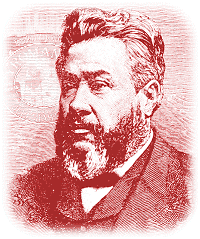posted by Phil Johnson
The PyroManiacs devote some space each weekend to highlights from The Spurgeon Archive. The Following excerpt is from a short article titled "Not a Doubt of It!"—published in the February 1884 edition ofThe Sword and the Trowel, in honor of Dr. William Graham, whose dying words provided the title for the article.
 rofessional preaching, ex-officio creed-repeating,—this is the devil's most effectual method of propagating falsehood and defeating truth.
rofessional preaching, ex-officio creed-repeating,—this is the devil's most effectual method of propagating falsehood and defeating truth. Full assurance of the certainty of what we preach in the name of the Most High God is absolutely necessary to making full proof of our ministry; in fact, it is questionable whether it is ministry for God at all if it is not the ministry of faith. If whatsoever is not of faith is sin, and men are forbidden to do that about which they have any scruple; much more, in sacred things, must a preaching that is not of faith be sin; and how can sin promote the righteousness of God? If Jesus the Son of God be not really and truly God to any man; if that man shall dare to assert the doctrine of the Redeemer's Deity, he will but do the truth dishonor. We may not forbid his preaching, but if the Master were here he would as surely silence him as he did the devils when they loudly attested that he was the Son of God.
Full assurance of the certainty of what we preach in the name of the Most High God is absolutely necessary to making full proof of our ministry; in fact, it is questionable whether it is ministry for God at all if it is not the ministry of faith. If whatsoever is not of faith is sin, and men are forbidden to do that about which they have any scruple; much more, in sacred things, must a preaching that is not of faith be sin; and how can sin promote the righteousness of God? If Jesus the Son of God be not really and truly God to any man; if that man shall dare to assert the doctrine of the Redeemer's Deity, he will but do the truth dishonor. We may not forbid his preaching, but if the Master were here he would as surely silence him as he did the devils when they loudly attested that he was the Son of God.If the Bible be not believed to be a supernatural book, infallibly teaching the things which make for our eternal salvation, he who, with deliberate falsehood of unbelief, yet uses it as his text-book, and refers to it as his authority, is a trifler with truth, and a mocker of sacred things. If a man believes that there is no such thing as regeneration, or that men do not need it, his attempt to preach concerning the new birth will only scatter among the multitudes doubts as to its reality.
Whatever is held forth in the palsied hand of unbelief is itself made to quiver. Skepticism is a smoking lamp, which, while it gives no light, loads the atmosphere with a thick darkness, if not with a stench. If we are ever to see men brought down under the power of the law to a condition of true repentance, if we are ever to see them converted by the Holy Ghost through the gospel of Christ Jesus, if we are ever to see the converted ones sanctified, and marching forth to the Master's battles as an army with banners, we must preach the truth boldly, as we ought to preach it, and we must say of every jot and tittle of it, "Not a doubt of it! Not a doubt of it:"
It seems to be assumed by many men that there is no sin in doubting God's Word; indeed, they count it one of the highest attainments of their intellect that they dare coolly give the lie to the glorious Jehovah. To us it seems that there is no impiety greater than to quibble and question with our Creator. To fancy the Holy Spirit to be ignorant, or mistaken, or a false witness, must very nearly verge upon the sin which is unto death.
Everywhere throughout the Scriptures faith is magnified as the chief root of virtue, and unbelief is stamped with infamy as a soul-destroying evil. Error in doctrine is as truly a crime as adultery or theft. Who is he that has set man's intellect free from the dominion of the Most High? Men of old said, "Our tongues are our own"; and now they say, "Our minds are our own": the spirit of rebellion dictates both defiant speeches. The first and great commandment bids us love the Lord our God, not only with all our heart. but also with all our mind. The intellect is a part of the creature, and is therefore bound to be subservient to the Creator. In a redeemed man his intellect is not his own, for it is bought with a price; he counts it an essential of his discipleship that he should receive Christ's word as a little child.
Pride reviews the acts of God, and censures his utterances, criticizes infinite wisdom, picks and chooses, and commends or censures the teachings of the Lord. This daring presumption makes human reason the last Arbiter, and sets man upon the throne as though he were the god of God. To all this the apostle Paul deigns no reply but this —"Nay but, O man, who art thou that repliest against God?"
Quitting this chaos of doubt, flying from this Stygian bog of skepticism, we pray the Lord to maintain our sure confidence in eternal verities, and to enable the minds of his people to get so firm a grip of what he has revealed that they may all cry, "Let God be true, and every man a liar." Then shall we feel in our own hearts the power of truth, then shall we see in the consciences and minds of others the same power working supernaturally to their conversion and sanctification: but not till then.
Incredulity is absurdity where God is concerned; nay, worse, it is constructive blasphemy. Doubt of revealed truth is death to communion with him who has revealed it. How can a man commune with another man till he has given him his fullest confidence? We can have no fellowship with those whom we distrust; the unbeliever can have no fellowship with God. "Without faith it is impossible to please God;" therefore the spirit of doubt which is now abroad must be greatly displeasing to him; and if God be displeased how is the church to prosper?












11 comments:
Good quote. This sounds a lot like the liberals of our day who just want to teach the ethic of Christ (at best), a notion even some professing atheists would partially accept.
Yes. It seems to me obvious that power in preaching is directly connected to the belief in biblical inerrancy. This doctrine has been deemed intellectually vacant or quaintly naive by the last couple of generations of seminarians (see Lindsell's "The Battle for the Bible"). And just look at the result. Teeming masses of smiling, vacant self-help sponges soaking up mindless, powerless, oratorical palaver and calling it "church."
Stygian bog indeed!
"Error in doctrine is as truly a crime as adultery or theft.'
And as all other sin as well.
This prince of preachers truly wielded the Sword of the Spirit.
very edifying once again.
Take THAT, David, Habakkuk, Jeremiah and Job!!!!
It seems like a lot of my favorite passages are watching God's people wrestle with Him during their "dark night of the soul". It seems like they become the sort of people they are because they take God seriously enough to "take it up with Him" when what they see in the world doesn't seem to make sense in light of His promises. Even when His response is censure, it seems as though those who "doubt in faith" (?) seem to go away blessed and reassured.
Apples and oranges, Blue,
Tell me it isn't true;
But the truth remains,
Without a doubt...
Contrariness becomes you.
Jeremy,
We should totally have a haiku-off to see if my comment was valid or not!
in lieu of that, though, I'll admit that I get Spurgeon's point, and I think those intellectuals who "cooly give the lie" to God are guilty of refusing to wrestle with God. My point was just that the godliest models we can find in the Bible seem to suggest that receiving God's Word often involves more difficult and more of a struggle than, "not a doubt, not a doubt!"
David, Habakkuk,
Jeremiah and Job,
No doubt in God's Word they hold,
Rather, they, and sometimes me,
While full of faith, still can't see.
And all of God's Word,
We know is sure and true,
Sorry, Blue...I can't finish it.
David, Habakkuk, Jeremiah and Job and whoever else you want to include, usually begin with the presupposition that whatever God's says is true. And when they don't understand how it can be true, still believing, they continue to go to God and ask Him, since He is true.
Habakkuk, for instance, never once doubts what God has said. He goes to God in prayer, asking how long God will let Judah rebel and gets his answer. "The Babylonians are coming." He then goes to God in prayer, asking how God can allow the heathen to exact His judgments on the righteous. God's answer is, "The righteous will live by faith." The closing verses of the book show Habakkuk's attitude from the start, "Although everything looks bad around me, I will trust in God."
I don't see doubt in the book. I see a man who doesn't understand completely what God is doing, while having questions, still living by faith in God and trusting what God has spoken.
Thank you for posting so much Spurgeon content! His message(s) is as relevant today among a postmodern audience as it was in his day against a modernist audience. The challenge is the same, and the choice that evangelicals have to make is the same.
Check out your namesake in Jeremiah 20:7-8.
Were David, Habbakuk, Jeremiah, and Job leading others astray with false teaching based on the premise that we know better than God?
Sewing,
Not sure if your rhetorical question supports or refutes my observation - but since it IS a rhetorical question, at least we all know the answer already!
Post a Comment